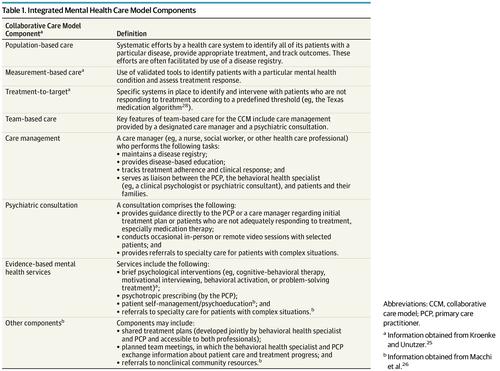当前位置:
X-MOL 学术
›
JAMA Pediatr.
›
论文详情
Our official English website, www.x-mol.net, welcomes your feedback! (Note: you will need to create a separate account there.)
Key Components of Effective Pediatric Integrated Mental Health Care Models
JAMA Pediatrics ( IF 26.1 ) Pub Date : 2020-05-01 , DOI: 10.1001/jamapediatrics.2020.0023 Juliet Yonek 1, 2 , Chuan-Mei Lee 1, 3 , Anna Harrison 1, 4 , Christina Mangurian 1, 2 , Marina Tolou-Shams 1, 2
JAMA Pediatrics ( IF 26.1 ) Pub Date : 2020-05-01 , DOI: 10.1001/jamapediatrics.2020.0023 Juliet Yonek 1, 2 , Chuan-Mei Lee 1, 3 , Anna Harrison 1, 4 , Christina Mangurian 1, 2 , Marina Tolou-Shams 1, 2
Affiliation

|
Importance
Emerging evidence suggests that integrated care models are associated with improved mental health care access and outcomes for youths (children ≤12 years and adolescents 12-21 years) served in pediatric primary care settings. However, the key components of these complex models remain unexamined. Objective
To identify and describe the key components of effective pediatric integrated mental health care models. Evidence Review
The PubMed, Embase, PsycINFO, and Cochrane Controlled Register of Trials electronic databases were searched for relevant peer-reviewed articles published between January 1, 1985, and April 30, 2019. Articles were restricted to those published in the English language. Eligible articles reported original data on youths 17 years or younger, implemented an integrated mental health care model in a pediatric primary care setting, and assessed the model's association with primary outcomes (eg, mental health symptom severity) and secondary outcomes (eg, functional impairment and patient satisfaction). Articles that specified some degree of systematic coordination or collaboration between primary care and mental health professionals were included in the final review. Two independent reviewers extracted data on study design, model type, model components, level of integration, and outcomes. Study quality was assessed using the Jadad scale. Data were analyzed between January 1, 2018, and May 31, 2019. Findings
Eleven randomized clinical trials involving 2190 participants were included. Three studies focused on youths with depression, 3 on youths with attention-deficit/hyperactivity disorder, and 5 on youths with behavioral disorders. Most studies (9 of 11) implemented either the collaborative care model (n = 3), a slightly modified version of the collaborative care model (n = 2), or colocated care (n = 4). The most commonly reported components of effective pediatric integrated mental health care models were population-based care, measurement-based care, and delivery of evidence-based mental health services; all 3 components were present in studies reporting clinical improvement of mental health symptoms. Other model components, such as treatment-to-target or team-based care, were common in studies reporting specific outcomes, such as functional impairment. Conclusions and Relevance
This review is the first to date to systematically search and qualitatively synthesize information on the key components of effective pediatric integrated mental health care models. This knowledge may be especially useful for pediatric primary care administrators in the selection of an integrated care model for their setting.
中文翻译:

有效的儿科综合心理保健模式的关键组成部分
重要性 新出现的证据表明,综合护理模式与改善在儿科初级保健机构中服务的青少年(≤12 岁儿童和 12-21 岁青少年)的心理卫生保健机会和结果有关。然而,这些复杂模型的关键组成部分仍未得到检验。目的 确定和描述有效的儿科综合心理保健模式的关键组成部分。证据审查 在 PubMed、Embase、PsycINFO 和 Cochrane Controlled Register of Trials 电子数据库中搜索了 1985 年 1 月 1 日至 2019 年 4 月 30 日期间发表的相关同行评审文章。文章仅限于以英语发表的文章。符合条件的文章报道了 17 岁或以下青少年的原始数据,在儿科初级保健环境中实施了综合心理健康保健模型,并评估了该模型与主要结果(例如,心理健康症状严重程度)和次要结果(例如,功能障碍和患者满意度)的关联。规定初级保健和精神卫生专业人员之间某种程度的系统协调或合作的文章被纳入最终审查。两名独立审查员提取了有关研究设计、模型类型、模型组件、整合水平和结果的数据。使用 Jadad 量表评估研究质量。对 2018 年 1 月 1 日至 2019 年 5 月 31 日期间的数据进行了分析。 结果 纳入了涉及 2190 名参与者的 11 项随机临床试验。三项针对抑郁症青少年的研究,3 项针对有注意力缺陷/多动障碍的青少年,5 项针对有行为障碍的青少年。大多数研究(11 个中的 9 个)实施了协作护理模型(n = 3)、协作护理模型的略微修改版本(n = 2)或协同护理(n = 4)。有效的儿科综合心理健康护理模式中最常报告的组成部分是基于人群的护理、基于测量的护理和提供基于证据的心理健康服务;所有 3 个组成部分都出现在报告心理健康症状临床改善的研究中。其他模型组件,例如针对目标的治疗或基于团队的护理,在报告特定结果(例如功能障碍)的研究中很常见。结论和相关性 本综述是迄今为止首次系统地搜索和定性综合有关有效儿科综合心理健康护理模式的关键组成部分的信息。这些知识对于儿科初级保健管理员在为其环境选择综合保健模式时可能特别有用。
更新日期:2020-05-01
中文翻译:

有效的儿科综合心理保健模式的关键组成部分
重要性 新出现的证据表明,综合护理模式与改善在儿科初级保健机构中服务的青少年(≤12 岁儿童和 12-21 岁青少年)的心理卫生保健机会和结果有关。然而,这些复杂模型的关键组成部分仍未得到检验。目的 确定和描述有效的儿科综合心理保健模式的关键组成部分。证据审查 在 PubMed、Embase、PsycINFO 和 Cochrane Controlled Register of Trials 电子数据库中搜索了 1985 年 1 月 1 日至 2019 年 4 月 30 日期间发表的相关同行评审文章。文章仅限于以英语发表的文章。符合条件的文章报道了 17 岁或以下青少年的原始数据,在儿科初级保健环境中实施了综合心理健康保健模型,并评估了该模型与主要结果(例如,心理健康症状严重程度)和次要结果(例如,功能障碍和患者满意度)的关联。规定初级保健和精神卫生专业人员之间某种程度的系统协调或合作的文章被纳入最终审查。两名独立审查员提取了有关研究设计、模型类型、模型组件、整合水平和结果的数据。使用 Jadad 量表评估研究质量。对 2018 年 1 月 1 日至 2019 年 5 月 31 日期间的数据进行了分析。 结果 纳入了涉及 2190 名参与者的 11 项随机临床试验。三项针对抑郁症青少年的研究,3 项针对有注意力缺陷/多动障碍的青少年,5 项针对有行为障碍的青少年。大多数研究(11 个中的 9 个)实施了协作护理模型(n = 3)、协作护理模型的略微修改版本(n = 2)或协同护理(n = 4)。有效的儿科综合心理健康护理模式中最常报告的组成部分是基于人群的护理、基于测量的护理和提供基于证据的心理健康服务;所有 3 个组成部分都出现在报告心理健康症状临床改善的研究中。其他模型组件,例如针对目标的治疗或基于团队的护理,在报告特定结果(例如功能障碍)的研究中很常见。结论和相关性 本综述是迄今为止首次系统地搜索和定性综合有关有效儿科综合心理健康护理模式的关键组成部分的信息。这些知识对于儿科初级保健管理员在为其环境选择综合保健模式时可能特别有用。


























 京公网安备 11010802027423号
京公网安备 11010802027423号